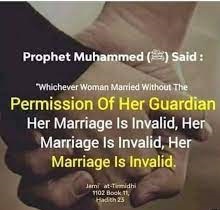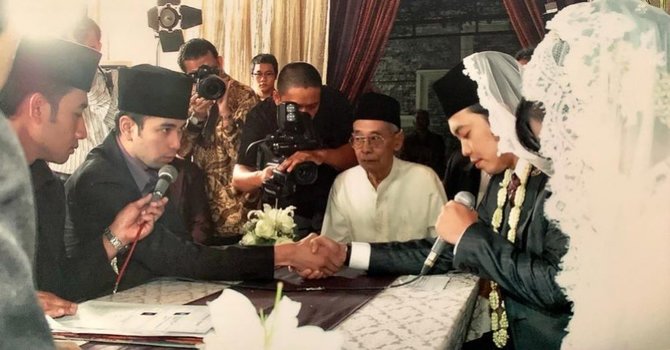The following article discusses the walīy’s permission as a condition of validity of Nikah in Islam, especially in the 21st century, and answers the question whether this practice in any way lowers the status of a Muslimah

Islām lays down principles and guidance about every aspect of life, marriage being no exception. The Shariāh outlines rulings about marriage right from the selection of the spouse to pillars and conditions of the contract and more. One such condition is the permission of a woman’s walīy.
This paper aims to discuss this condition in detail, keeping in mind that we are now in the 21st century and feminism is a major concern for many of us. We shall look at the various proofs from the Qurʾān, Sunnāh and opinions of scholars to come to a conclusion regarding the obligation of the above condition. We shall also try to understand whether this condition designates the status of the woman to be inferior to men, or there is better wisdom to it.
There are different opinions regarding the obligation of permission of walīy (legal guardian), however, the vast majority of scholars rule that it a condition (shart) for nikāh of women. Out of the four major schools of Islāmic jurisprudence, three (Shafi’i, Māliki and Hanbalī) and a majority of scholars have ruled that this is a condition for the validity of marriage (Khan, 2017) and that the contract doesn’t take place without it. Let us first see the proofs quoted by them for their deduction.
Qurʾānic proof:
Two words have been used for commands regarding the marriage contract (nikāh). Na-ka-ha (نكح) which is an intransitive verb implying the object to be oneself i.e., one’s own marriage. The other being an-ka-ha(أنكح) , a transitive verb denoting an action of conducting the marriage of another individual. We can see that the intransitive verb in the masculine gender has been used for the marriage of men while for women the transitive masculine verb has been used implying that for the marriage of women, the male walīy who takes the responsibility of marrying them off, is being addressed by Allāh ﷻ. The marriage contract, in fact, is ratified between the groom and the walīy, with the woman’s consent.
“…do not marry polytheistic women until…” (Qurʾān, 02:221).
Also, alluding to the marriage of his daughter, the father of the wife of Musa AS says, “I wish to marry one…to you…” (Qurʾān, 28:27).
Ḥadīṯ proof:
 The Prophet ﷺ stated, repeating thrice, “There is no marriage except with a Walīy” (Jami` at-Tirmidhi, 1101). This has been reported by five out of six compilers of Ḥadīṯ (al-Fawzan, 2012). Other aḥadīṯ imply the same on other occasions.
The Prophet ﷺ stated, repeating thrice, “There is no marriage except with a Walīy” (Jami` at-Tirmidhi, 1101). This has been reported by five out of six compilers of Ḥadīṯ (al-Fawzan, 2012). Other aḥadīṯ imply the same on other occasions.
Some scholars differentiate in the powers of a walīy according to the previous marriage status of the woman, quoting the ḥadīṯ, “A woman who has been previously married has more right to her person… (Sahih Muslim, 1421b), thus, categorizing the guardian as Walīy al-mujbir and walīy al-mushārik. Nevertheless, the walīy does play a role in both conditions. Some scholars like, Imam Abū Ḥanīfa, Ḥasan al-Baṣrī, Az-Zuhrī, etc. opine that a woman can independently enter a marriage contract, but even these scholars, accept this with certain conditions, and such scholars are definitely much fewer (Qadhi, 2020).
Regarding this condition in the 21st century, we know that it is still as important now as it was at the time of the Ṣaḥābāh. The verse, “…Today I have perfected your faith for you…” (Qurʾān, 04:03) indicates that no established ruling of Islām needs to change in any era, because it has been decided by the Creator in our best interest. It is impossible that such a ruling holds woman inferior to men, because superiority in the estimation of Allāh ﷻ is only in terms of taqwāh, “Verily, the most honoured…most righteous…” (Qurʾān, 49:13). However, rulings for both sexes can differ because they are different biologically and psychologically, “…And the male is not like the female” (Qurʾān 3:36).
In Islām, women have been honoured by the protection of men, “…men are Qawwām (maintainers) of women” (Qurʾān, 4:34). This has to do with extending protection and being responsible for their provision, security and wellbeing, rather than being their masters. In a marriage, a girl who is already in the protection of her father (or guardian) as her walīy, enters into the guardianship of her husband. A father, who is naturally most protective and caring for his daughter, shoulders the responsibility of being her marriage guardian. In his absence, his wakil or other close male relatives from his family take over this responsibly (Birjas, n.d.).
This increases the dignity of the lady and she is considered respectable by the groom, because, as we are aware, even in the most modern societies, a woman who is easily available is not as respected as the one who is not. Moreover, in case there are issues in the marriage, she cannot be taken lightly; people know that she is supported by her walīy (Mohd et al., 2015).
Islām views marriage more as a contract ensuring a secure, contented life leading to religious and upright progeny and building a healthy society, rather than just a romantic relationship. Allāh ﷻ has bestowed many rights on women through their husbands, like kind treatment, mahr (Qurʾān, 04:04), accommodation, provision for her and the children, “but the father… shall bear the cost… (Qurʾān, 02:233). A mature selection of someone capable of fulfilling these, is necessary. Failure to do so is more harmful in case of a woman, because, an incorrect, emotional decision can cost her much more in her life than a man. Also, in case of issues with the marriage, a walīy may have to take over the responsibility of the woman and her children, so he must have a hand in the decision making, too.
Regarding equality in gender, a walīy’s permission as a condition for women’s marriage, does not automatically imply that a male is totally independent. Islām lays a lot of importance on following the ones in command, consultation in decisions and obeying parents. Hence, even a man is expected to take his father’s permission for marriage, although not obligatory for the contract “…You…belong to your father” (Sunan ibn-Mājah, 2291).
Allāh ﷻ has kept checks and balances in the form of rights and duties in various relationships. The tafsīr of ayāt 231-32, mentions an incident of M’aqil Ibn-Yāsar as their probable background (Ma’ariful Qurʾān, 231-32). The incident helps infer two points, namely, the recognition of the walīy’s authority and secondly, the expectation from the walīy of not being a hindrance to a fair and mutually agreed marriage. In spite of all good intentions, he cannot force the marriage on a sane and free woman, she has to agree to the marriage, either through silent consent or verbal acknowledgement, “…should the woman be asked her consent…” (Sahih al-Bukhari, 6946).
We can thus conclude, that the permission of the woman’s walīy is a condition for nikāh, according to the majority of scholars, excluding a very small minority. There definitely is wisdom to the ruling as a safeguard for women who are generally weaker and more vulnerable in marriage. It is a means of increasing their value and respect in the marriage and in no way does it make them inferior to the male. Keeping aside the idealistic notion of absolute equality between sexes, Islām focusses on practicalities and ensures total justice in both worlds.
References
Al-Fawzan, S. (2012). A summary of Islamic jurisprudence = Al-Mulakhkhas al-Fiqhi (Vol. 2). Dar al-Maiman Publishing House.
Birjas, Y. (n.d.-a). “Of love–may God exalt you! -the first part is jesting, and the last … https://www.kalamullah.com/Books/Fiqh%20Of%20Love.pdf
Jami` at-tirmidhi 1101 – the book on marriage – كتاب النكاح عن رسول الله صلى الله عليه وسلم – sunnah.com – sayings and teachings of Prophet Muhammad (صلى الله عليه و سلم). (n.d.). https://sunnah.com/tirmidhi:1101
Khan, A. A. (2017, November 12). Marrying without the consent of the Wali (a case study of Pakistan) compatibility of Pakistani family laws with udhr. SSRN. https://papers.ssrn.com/sol3/papers.cfm?abstract_id=3067457
Mohd, A., Ibrahim, B., & Abdul Razak, S. (2015). Protecting women’s interest (maslahah) in marriage through appointment. https://www.researchgate.net/publication/316546146_Protecting_women’s_interest_Maslahah_in_marriage_through_appointment_of_a_guardian_Wali_under_Islamic_law
Qadhi, Yasir. (2020, October). Is a Wali (Guardian) Required in an Islamic Marriage. Epic masjid. Retrieved May 16, 2023, from https://www.youtube.com/@EPICMASJID/playlists
Qurʾān, 02:221
Qurʾān, 02:233
Qurʾān, 02:234
Qurʾān, 03:36
Qurʾān, 04:03
Qurʾān, 04:04
Qurʾān, 04:34
Qurʾān, 28:27
Qurʾān, 49:13
Sahih al-Bukhari 6946 – (statements made under) coercion – كتاب الإكراه – sunnah.com – sayings and teachings of Prophet Muhammad (صلى الله عليه و سلم). (n.d.-a). https://sunnah.com/bukhari:6946
Sahih Muslim 1421b – the book of marriage – كتاب النكاح – sunnah.com – sayings and teachings of Prophet Muhammad (صلى الله عليه و سلم). (n.d.). https://Sunnah.com/muslim:1421b
Sunan ibn Majah 2291 – the chapters on business transactions – كتاب التجارات – Sunnāh.com – sayings and teachings of Prophet Muhammad (صلى الله عليه و سلم). (n.d.). https://Sunnāh.com/ibnmajah:2291
Surah Al-Baqara 2:231-232 – Maariful Quran – Maarif ul quran – quran translation and commentary. (n.d.). https://islamicstudies.info/quran/maarif/maarif.php?sura=2&verse=231
Dr Shazia Nahri, based in Aurangabad, is among the toppers at the International Online University of Kanifing, The Gambia. Founded as the Islamic Online University by Bilal Philips in 2007, the university offers undergraduate and graduate courses in Islamic studies.




